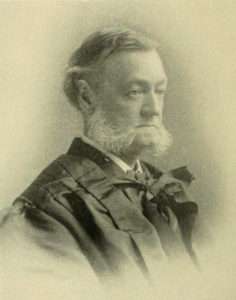The Volokh Conspiracy
Mostly law professors | Sometimes contrarian | Often libertarian | Always independent
Today in Supreme Court History: July 26, 1892
7/26/1892: Justice George Shiras Jr. takes oath.

Editor's Note: We invite comments and request that they be civil and on-topic. We do not moderate or assume any responsibility for comments, which are owned by the readers who post them. Comments do not represent the views of Reason.com or Reason Foundation. We reserve the right to delete any comment for any reason at any time. Comments may only be edited within 5 minutes of posting. Report abuses.
Please to post comments


DeBoer by Darrow v. DeBoer, 509 U.S. 1301 (decided July 26, 1993): Stevens denies (on grounds of lack of a federal issue) couple's petition to stay Michigan Supreme Court's order to hand over to biological parents the baby girl they had taken care of for two years; Michigan held that papers signed by biological mother giving child up for adoption were defective and did not have required 72-hour waiting period. Years ago when I ran a crisis center I allowed it to serve as the site for handing over children in such situations, or for later visitations with a biological parent who had lost custody, and there is no more heartbreaking scene.
Trump v. Sierra Club, 140 S.Ct. 1 (decided July 26, 2019): staying the District Court's injunction against building the border wall (on both environmental and humanitarian grounds) pending Ninth Circuit determination and then possible certiorari on the grounds that plaintiffs probably have no standing to bring suit in the first place; Ginsburg, Sotomayor and Kagan dissent; Breyer notes the harm if the wall is built (environmental damage) versus the Gov't's claim of harm if not built (construction contracts not finalized and loss of funds) and argues that a middle way would be to stay construction but let the contracts get finalized. (A year later the Court maintained the stay even though contracts had been finalized, so the wall got partly built, but when Biden came in he stopped the project and the parties agreed to discontinue.)
Shiras seems to be a nonentity though he authored more than 250 decisions. One of the majority in Plessy v. Ferguson but Henry Billings Brown wrote the decision. Brown is forgotten as well except for that decision.
Who is the last Justice (beside Kagan) who had facial hair?
Thomas has sort of a mustache, maybe. If not him, Thurgood Marshall.
Nice Beard, but no Law Degree, watta Country!
See also Abraham Lincoln.
Law schools are a relatively modern innovation. Prior to their proliferation, most attorneys were admitted to the bar by "reading law", that is apprenticing under an experienced attorney for a period of years. Seven states (California, Vermont, Virginia, Washington, New York, Maine, and Wyoming) actually still allow this path to admission.
The first justice who actually attended law school was Levi Woodbury, recess-appointed by President Polk in 1845. Woodbury was the 30th individual to serve as a member of the Court. The first justice who actually had a degree from a law school was Benjamin Robbins Curtis, a President Fillmore recess appointee in 1851, and 32d member of the Court. Obviously, they were preceded by some legal luminaries (John Marshall and Joseph Story particularly come to mind). The last justice not to attend law school was James F. Byrnes, appointed to the Court by President Franklin Roosevelt in 1941.
Justice George Shiras, Jr. was a relatively unremarkable member of the "Businessman's Court", the Supreme Court that from the late 19th century onward routinely struck down regulations on business as violative of economic substantive due process rights. Shiras was a member of Court that held, in United States v. E. C. Knight Co., 156 U.S. 1 (1895), that "manufacture" was not "commerce", and therefore beyond the power of Congress to regulate. This would be the dominant jurisprudence of the Court until it was all swept away by West Coast Hotel Co. v. Parrish, 300 U.S. 379 (1937).
Shiras would probably be consigned to complete obscurity if not for his (alleged) role in Pollock v. Farmers' Loan & Trust Co., 157 U.S. 429, on rehearing, 158 U.S. 601, (1895), concerning the income tax levied under the Revenue Act of 1894.
In its initial opinion, the Court, in an opinion by Chief Justice Melville Fuller, struck down some portions of the Act, but stated that on broader questions of the overall validity of an income tax, that the Court was "equally divided" so that no pinion was expressed. The equal division was necessarily 4-4 as the gravely ill Justice Howell Edmunds Jackson did not participate. A rehearing was ordered. This time a 5-4 Court declared the income tax unconstitutional. Justice Jackson (who would be dead in four months) had essentially crawled out of his deathbed to vote to uphold the Act. So, simple mathematics tells us someone changed his vote. But who?
The chief suspect was Shiras. However, in the biography of Shiras begun by his son and completed by his nephew, the authors argued that Shiras had not changed his vote. George Shiras III and Winfield Shiras, Justice George Shiras, Jr. of Pittsburgh (1953). The true culprit will likely never be known.
The Pollock decision was highly unpopular, which made Shiras highly unpopular. The general population, knowing that Congress would only ever levy an income tax on the uber-wealthy and never dare to do so on middle- and lower-incomes, saw the decision as just another protection for the wealthy. The decision would, of course, be superseded by the ratification of the Sixteenth Amendment in in 1913.